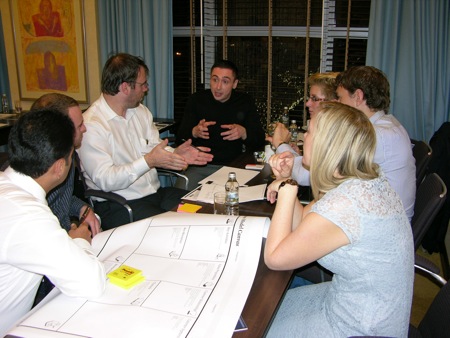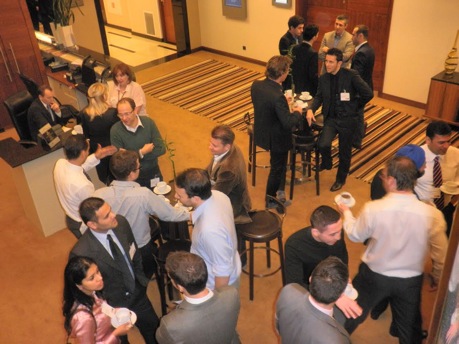FINAT Young Managers Club Learns How to Lead the Way at YMC Summit
Press release from the issuing company
The Label Industry Manages Lifecycle Change
As in every aspect of life, time has not stood still for the self-adhesive label industry. Since its beginnings in the 1930s, it has evolved continuously on every front – in terms of materials, print technologies, dispensing technologies, and, of course, people. Many of the entrepreneurs who, in the 1970s and 1980s, created the extraordinary web of small label printing businesses that formed the backbone of today’s massive global industry are today retirees. Their companies – which have claimed some 50% of the world’s label business – have been the subject of M&A activity, of cross-border partnerships. However, as in all family businesses, as time moves on, they are the subject of generation change. FINAT’s Young Managers Club – a lively part of the European self-adhesive labelling association’s infrastructure– is dedicated to making that process work.
Great ideas with limited resources
The FINAT Young Managers Club held its second Summit in Warsaw in November 2013. Its headline – ‘great ideas with limited resources’ – was chosen to reflect the challenges the industry faces in terms of rising costs and competitive technologies, but most of all to create a professional platform for grasping, and successfully developing, future business opportunities. Some 40 ‘young managers’ from companies representing the self-adhesive labelling supply chain across Europe and beyond, came together at the Summit to benefit both from a strong agenda that combined the context of the industry with leading-edge management practice through workshops, and valuable networking opportunities.

Business model innovation
Leading companies around the globe recognise the need to rethink their business models to reflect the current environment. The first summit workshop on 'Where can we innovate?', took the participants through the process of ‘sketching’ a business model canvas. By identifying the structural segments – customers, offer and needs, infrastructure, and financials – and the key trends, market forces, macroeconomic and industry forces that impinge upon them, different approaches to a business model profile can be tested and adopted. Starting with a blank business model ‘canvas’, participants formed small groups to look at the extant business models in different label market segments – from wines and spirits to pharmaceuticals –defining their strengths and weaknesses. Their task then was to identify ways to improve them, and then to present their results for the benefit of all the delegates. The efficacy of the exercise was strongly proven by the amount of lively feedback from the floor.
Label industry trends and opportunities
Next morning’s programme opened with an evaluation of trends and opportunities within the label industry, from Roger Pellow (UK), Chairman, Labels & Packaging Group, Tarsus – publishers of Labels & Labeling International and founders and organisers of the Labelexpo event. "This is a great industry… but we are in a time of change – change in technology, and generation change. We are moving from a craft industry to a technology industry."
Mr Pellow showed how the role and function of labels are changing – for example, from an information carrier to a communications medium – and discussed the implications of the major external and internal developments today for the way the industry can successfully conduct its business. His overarching message was uncompromising. Managing change and implementing innovation in today’s label industry demands greater knowledge, education, and training.
Doing more with less
One of the major contributors to an efficient, cost-effective modus operandi in business today is lean manufacturing – and this was the topic that dominated the rest of the Summit’s agenda. Efficiency improvement is not only in manufacturing. Purpose, process, and people are all important parts of the equation. It is important to see the whole before fixing the parts.
Defining the business matrix: from problem definition to measurable results.
In another workshop participants were challenged, in groups, to complete an X-matrix chart, integrating strategies, tactics, processes, and results, for a specific type of business. This activity is acknowledged to be a valuable way of drawing together the different strings that make up a business. The matrix helps management to define its breakthrough goals; the desired business results to be achieved – a compass for strategy development and execution; the process metrics to be used; and the selection of implementation tactics and projects. Team members are named within the matrix, along with their responsibilities, and are accountable; and the final co-ordination and alignment, across the whole matrix, along with all complexities and dependencies, may be resolved step by step. Key message here is all about the importance of strategy. Strategy is a process that is lived daily or not at all. Strategy is not just lip service, but hard work, with transparent project planning, accountability, and control.
Participants were very impressed with the clear, focused, and comprehensive view that this thought matrix presented, truly reflecting the aim of their summit – implementing ‘great ideas with limited resources’.
Jules Lejeune, FINAT’s Managing Director, was full of praise for the event, and for the energy and enthusiasm of the Young Managers Club membership, and commented: ‘When the FINAT Young Managers Club was founded on the occasion of our 50th anniversary in 2008, the aim was to create a platform where incoming business leaders could connect FINAT’s successful past with a dynamic future. Now, five years later, the YMC itself has become an established feature of FINAT’s structure. Yet it is still refreshing to experience the continuing stream of the YMC’s high-quality, interactive, and business-oriented programmes, which are setting new standards in FINAT.’

"I am proud to have been chosen to represent the new generation of our dynamic industry," said Dana Kilarska, Young Managers Club President. "I am grateful for the opportunity the YMC has given me and my contemporaries to step into the future with the help of professionals and experts who can really broaden our knowledge and capabilities. We are young and eager to learn."
Next year event is a special YMC Global Congress in Chicago, USA, September 2014, jointly organised with TLMI (US) and LMAI (IN).
- Questions to ask about inkjet for corrugated packaging
- Can Chinese OEMs challenge Western manufacturers?
- The #1 Question When Selling Inkjet
- Integrator perspective on Konica Minolta printheads
- Surfing the Waves of Inkjet
- Kyocera Nixka talks inkjet integration trends
- B2B Customer Tours
- Keeping Inkjet Tickled Pink
© 2024 WhatTheyThink. All Rights Reserved.














